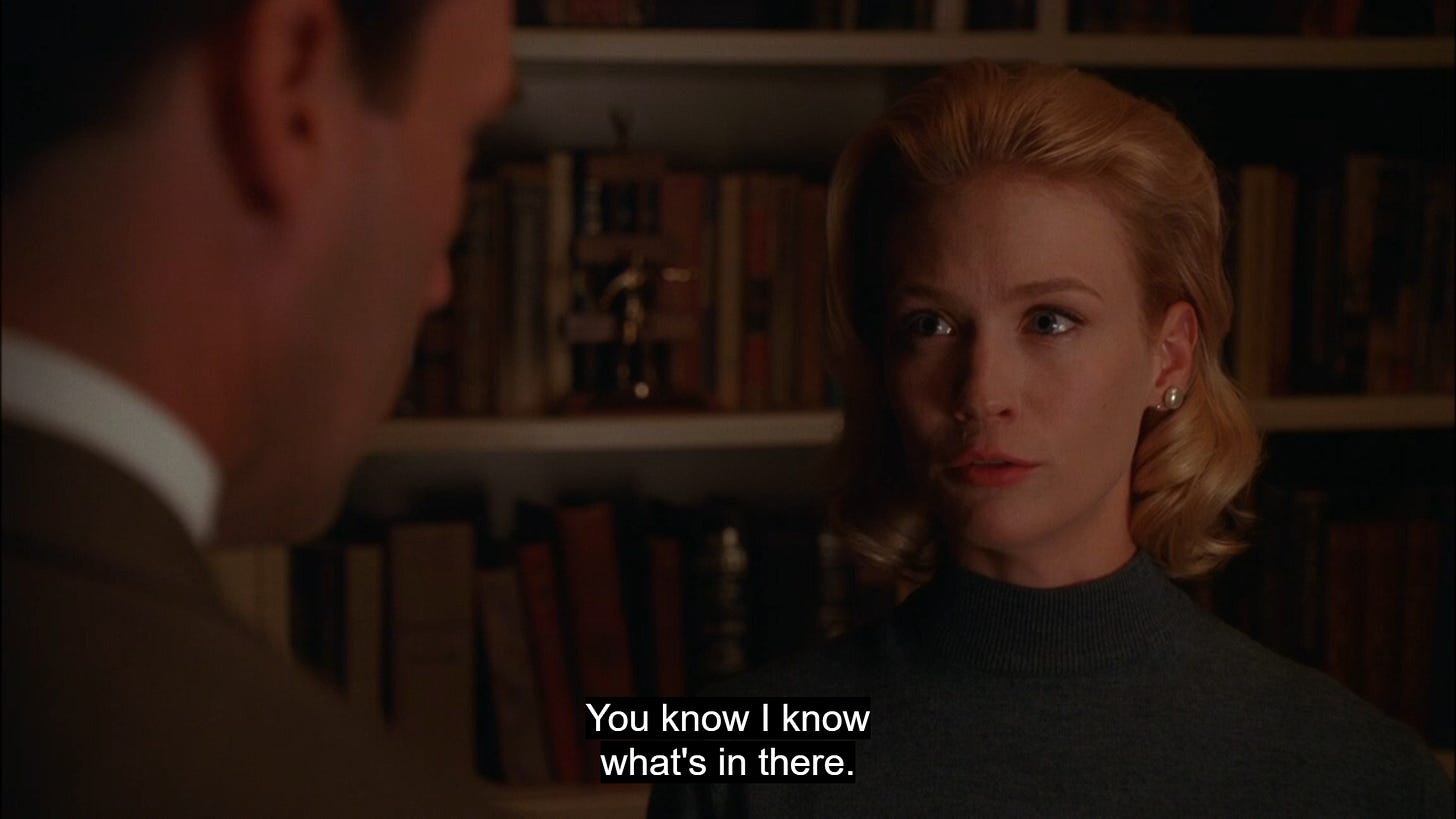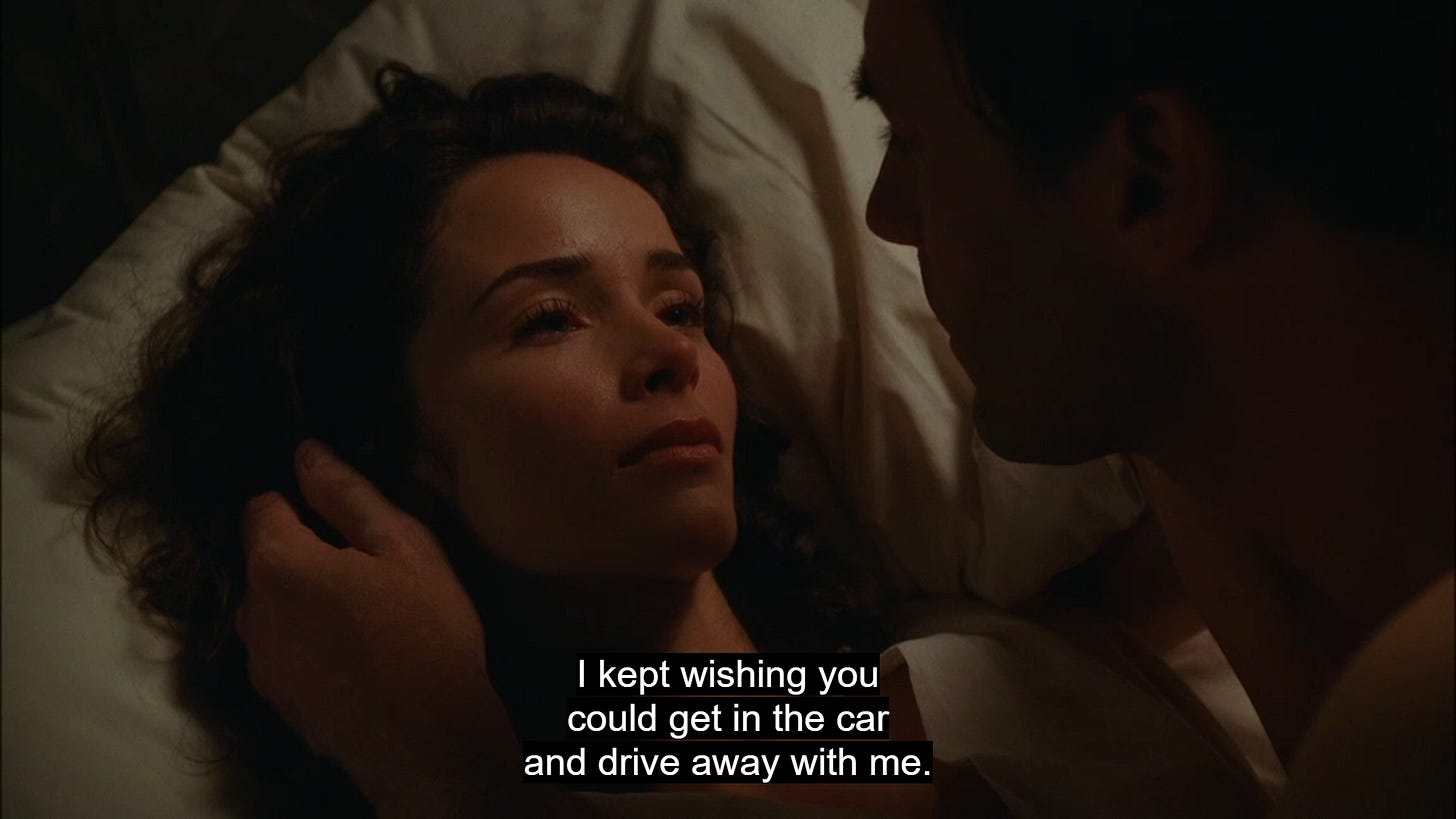Season 3: Episode 11
“The Gypsy and the Hobo”
Written by Marti Noxon, Cathryn Humphris, & Matthew Weiner
Directed by Jennifer Getzinger
Setting: October 1963 ending on Halloween night
My first subscriber article for Mad World was about why Mad Men had to end around Halloween. Don, a man who has spent his whole life pretending to be someone else, finds peace around a holiday that celebrates wearing a mask.
Why Mad Men Had to End on Halloween
I have a funny memory from before I became obsessed with Mad Men. It was a lazy October day cleaning the apartment and I decided to put on a random Halloween episode to set the mood. I thought it’d be a great idea to see if Mad Men (which at that point I had seen almost nothing of)
The finale is set seven years after this episode where a night of pretend and trick-or-treating offers no comfort. Don’s worst nightmare has come true, his wife Betty knows the truth about his past.
Don Draper is not a man, he is a mask.
He could lie through his teeth about any affair or other disaster in his life but this is the most vulnerable we have ever seen him. Betty is meeting his true self, afraid and resentful.
Say hello to Dick Whitman.


This episode has been anticipated since the reveal two seasons back that Don Draper stole a man’s identity. The dread of Betty’s coming confrontation has built over time and it is no coincidence that it was timed to happen before the JFK assassination.
Just as we know the inevitable for President Kennedy, the end of Don and Betty’s marriage has always been coming. In November, the 1960s as we know it begins in blood and sorrow.
How do you heal when a wound is so large that you cannot even recognize what was there before the bleeding?

The past has been wiped away in an instant and you sacrifice a previously unknown bliss in trying to understand why.
For such a devastating storyline that features January Jones giving one of the best episode performances of any character on the show, it was equally surprising that this episode is the most “Season 2” that this season gets. I often rag on season 2 as purposefully dull to show how these characters have dug themselves into ruts through their actions. The first half of “The Gypsy and the Hobo” is the last gasp of that kind of storytelling.
While Don and Betty deliver some of the greatest TV scenes of all time, Roger is reliving a love-affair with the heiress of a dog food company (that uses horse meat but we don’t have the time to get into that) who keeps comparing their life to Casablanca even though it is nothing like Casablanca.
Don’s short affair with school teacher Suzanne has grown especially mundane with both acting sloppy and lovestruck in their handling of it. It feels like Don doesn’t know how to have an affair which we know is not the case.

I believe this return of Season 2’s malaise is to remind the viewer what that season was about. 1962 was a void for these characters. Close your eyes and just pretend there aren’t missiles in Cuba and you’ll be fine.
In 1963, closing your eyes is not an option. In fact, they’ll be impossible to shut.
The world is changing, are you changing with it or staying in the past? Joan is clearly at odds with this rejection of change as she smashes a vase over her husband’s head when he won’t stop complaining about his failed career.
Over a phone call with Roger while looking for work, she can pretend everything is fine but not within the walls of her home. Joan’s husband Greg acts as if the future belongs to only him and she quickly brings him back to reality.
An oddly humorous but sad end to the Suzanne Farrell affair is seen in her awkwardly exiting Don’s car after sitting outside his home all night.
Suzanne and Don had planned to get away on a short trip but she was the last thing on his mind after Betty confronted him with proof that he had been lying about his identity.
Suzanne is not the most important thing in Don’s life and, in that moment, she realized that she never would be. Don yearned for comfort that Betty was not providing but that comfort was always momentary.
He is the great pretender, his mask never removed until Halloween.
The truth that Don does not accept is that he is happier as Dick Whitman. Being Don Draper opens bedroom and boardroom doors but this is a momentary numbing to the burden he feels of living another man’s life.
No more pretending. Don does not realize the power of telling the truth and that Betty may have understood and still loved him had he come clean about his past from the start. This show of complete honesty would have proven that she can trust him later.
Now, she is justified in her distrust for him.
As someone who loved him, Betty does feel sorry for the life he must have lived but a past of struggle does not justify a present of pretending.

You cannot close your eyes or look away in 1963.
Roger’s dull horse meat heiress storyline does play into this theme, even though we want to get back to more of Betty and Don. His lover from years ago had convinced herself that she could return to Roger who would resume love story like a classic movie but he had moved on.
Say what you will about Roger Sterling but he does not live in the past.
This painful present caused by a neglected past is about to be dwarfed by an unimaginable future.
We are less than a month away from President Kennedy’s assassination.
The most profound moments in our life can be immediately eclipsed by the world we all share. In celebration or in mourning, life continues around us and you can find peace or dismay from that.
We are not alone in suffering but we can be alone in how we respond to it.
No matter how bad the past was, the present feels, or the future may be — you do not have to be alone and you can help heal by making sure others are not alone too.








